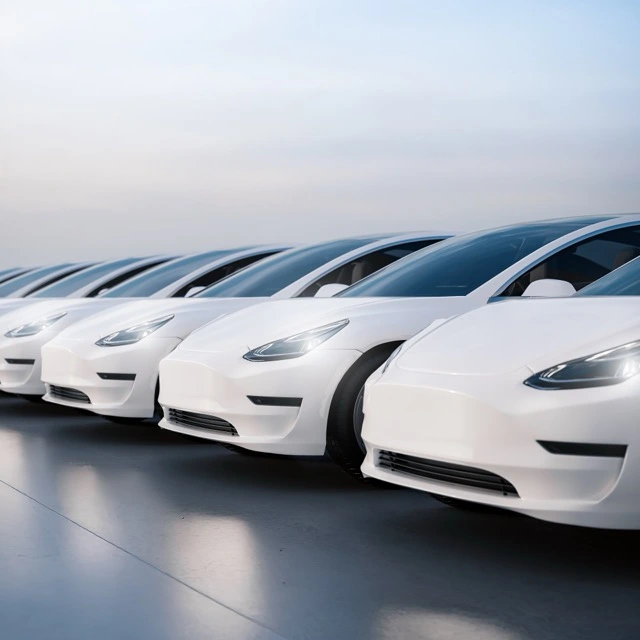How to Boost Commercial EV Fleet Sales?



The electric vehicle (EV) market is rapidly evolving, with commercial fleets representing one of the most significant growth opportunities for car manufacturers. Companies across industries from logistics and delivery to ride-sharing and public transportation are increasingly looking to electrify their fleets to reduce operating costs and meet sustainability goals. However, despite the clear benefits, many fleet operators are hesitant to make the switch due to one critical barrier: the lack of reliable and scalable charging infrastructure. This article will look at innovative charging solution that can help car manufacturers unlock the full potential of commercial EV fleet sales.
Car manufacturers like Ford, GM, Mercedes-Benz, and Rivian are investing heavily in electric vans, trucks, and other fleet vehicles. Yet, their efforts to grow commercial EV sales are often hampered by the slow rollout of charging infrastructure. Fleet operators, who rely on predictable uptime and operational efficiency, are wary of transitioning to EVs if they can’t access fast, reliable, and scalable charging solutions. The problem is compounded by the fact that grid-connected charging stations can take months or even years to deploy, leaving fleet operators stuck in a holding pattern.
Even when automakers offer their own charging infrastructure such as Ford’s Pro Charging or Mercedes-Benz’s charging network they remain dependent on the grid. This dependency creates delays and limits the flexibility fleet operators need to electrify their operations at scale. The result? Slower adoption of commercial EVs and missed sales opportunities for car manufacturers.
L-Charge is an innovative off-grid charging-as-a-service solution designed to meet the unique needs of commercial EV fleets. By utilizing mobile charging units powered by clean energy sources like hydrogen or liquefied natural gas (LNG), L-Charge provides fast, reliable, and scalable charging options. Here’s how it can help car manufacturers boost their commercial EV fleet sales:
L-Charge’s off-grid chargers can be deployed in a matter of days, not months. This means car manufacturers can offer fleet operators a turnkey solution that eliminates the wait for grid infrastructure. Imagine a logistics company transitioning to electric delivery vans and having access to L-Charge’s off-grid chargers immediately, ensuring their fleet stays operational while long-term grid-dependent infrastructure is being set up. This immediate availability can be a decisive factor in closing fleet sales.
Commercial fleets often operate dozens or even hundreds of vehicles, requiring charging infrastructure that can scale with their needs. L-Charge’s flexible design allows fleet operators to start small and expand as their EV fleet grows. This scalability makes it easier for car manufacturers to sell larger orders of EVs, knowing that the charging infrastructure can keep pace.
For fleet operators, downtime is lost revenue. L-Charge’s ultra-fast charging capabilities ensure that vehicles spend less time charging and more time on the road. This operational efficiency is a major selling point for car manufacturers, as it directly addresses one of the biggest concerns of fleet operators: maintaining productivity during the transition to EVs.
Many commercial fleets operate in areas where grid infrastructure is limited or non-existent, such as remote warehouses, construction sites, or rural delivery routes. L-Charge’s off-grid solutions can be deployed anywhere, providing fleet operators with the flexibility they need to electrify their operations without being constrained by grid availability. This opens up new markets for car manufacturers, particularly in regions where grid-dependent charging solutions are impractical.
Fleet operators are under increasing pressure to meet corporate sustainability targets. L-Charge’s use of clean energy sources like hydrogen and LNG aligns perfectly with these goals, allowing car manufacturers to position their EVs as part of a comprehensive green solution. This added value can be a key differentiator in competitive fleet sales.
Picture a delivery company like FedEx or Amazon transitioning to electric vans. By partnering with L-Charge, car manufacturers can ensure that these fleets have access to fast, reliable, and scalable charging infrastructure from day one. This not only accelerates the adoption of EVs but also strengthens the manufacturer’s value proposition, making it easier to close deals with fleet operators who might otherwise hesitate due to charging concerns.
Similarly, public transportation agencies looking to electrify their bus fleets can benefit from L-Charge’s off-grid solutions, which can be deployed at depots or along routes without the need for costly grid upgrades. This flexibility can be a game-changer for car manufacturers targeting the growing market for electric buses and other large fleet vehicles.
L-Charge is more than just a charging solution it’s a strategic enabler for commercial EV fleet adoption. By eliminating the delays and limitations of grid-dependent infrastructure, L-Charge empowers car manufacturers to overcome one of the biggest barriers to fleet electrification. With immediate deployment, scalability, fast charging, and off-grid flexibility, L-Charge provides the tools automakers need to close more fleet sales and accelerate the transition to electric mobility.
For car manufacturers looking to dominate the commercial EV market, partnering with L-Charge isn’t just an option it’s a competitive advantage. Together, we can drive the future of fleet electrification and create a cleaner, more sustainable world.